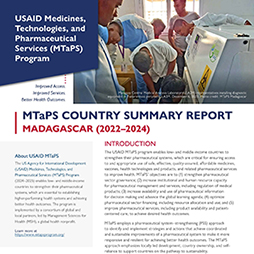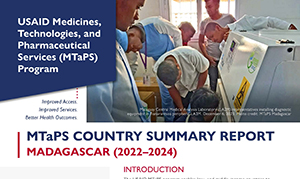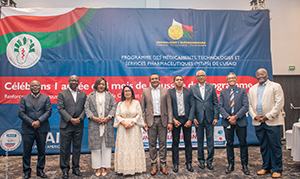MTaPS Support
In Madagascar, from 2022 to 2024, MTaPS provided technical assistance to the Ministry of Public Health (MOPH) to improve governance and management of the COVID-19 Response Mechanism (C19RM) launched by the Global Fund to address the challenges posed by the pandemic. The program strengthened pharmaceutical systems and services in the areas of Governance, Capacity and Supply Chain, and Information Systems.
Program Objectives
The MTaPS approach to enhancing Madagascar’s capacity to respond to the COVID-19 pandemic was based on USAID’s COVID-19 Global Response and Recovery Framework, and international evidence-based guidelines, including the quality and competency requirements for medical laboratories established by the International Organization for Standardization (ISO/IEC: 15189), which are used by the World Health Organization (WHO) on a global scale, and the guidance for COVID-19 antigen testing provided by US Centers for Disease Control and Prevention (CDC).
MTaPS’ strategic approach centered on:
- reinforcing existing health systems and leveraging established infrastructure and expertise;
- supporting national government coordination and regulatory bodies to develop and implement relevant policies and regulations;
- alignment with national strategies;
- promoting interagency collaborative mechanisms to ensure broad technical consensus;
- assuring participatory mechanisms for all methods, tools, and development of materials;
- building in required and refresher training provisions and quality management systems (QMS);
- developing record systems to support accountability;
- periodic compliance monitoring as per the adopted SOPs and plans.
MTaPS’ strategic approach also underscored the need for M&E to measure the system’s performance and capacity to ensure progress toward the country’s strategic health goals.
Key Achievements
Governance
- The C19RM fund is now functioning more optimally, following improvements in management processes, governance structures, and the clear definition of roles and responsibilities for all stakeholders involved, as a result of applying the Responsible, Accountable, Consulted, and Informed (RACI) matrix to master both management and the laboratory commodities supply chain.
- The C19RM fund absorption rate increased from 26% to 62% after one year, following the implementation of an institutional capacity building plan for the UCP-C19RM principal recipient, as well as sub-recipients and beneficiaries at the health facility level, which has improved their capacity to mobilize and utilize resources.
Capacity and Supply Chain
- Key MOPH personnel were empowered through the Leadership Development Program Plus (LDP+), focused on C19RM fund management, which enabled rational use of funds, further cascaded training, and contributed to the improvement of the C19RM fund’s absorption rate.
- Central and peripheral LA2M personnel were trained on the roles of the National Reference Laboratory (NRL) and the implementation of QMS through the LDP+ program, have contributed to improved laboratory performance and ensured compliance with national and international standards.
- Standardized supply chain management processes for integrated procurement of laboratory commodities at the MOPH have been adopted, preventing shortages and overstocking.
- Laboratory logistics management was harmonized across 14 USAID-supported regions through cascaded training for personnel from central to district levels, effectively addressing previous disparities in supply management.
Information Management
- MOPH-developed guidelines on laboratory data management were integrated into national DHIS2 software reporting mechanisms for malaria, HIV/AIDS, TB, and COVID-19.
- A road map was developed based on LA2M’s assessment of laboratories (LIS, data, and QMS) to guide future improvements in laboratory efficiency.
- LA2M’s information and networking systems were strengthened through a three-year mobilization plan aimed at enhancing surveillance and laboratory organization for prompt outbreak response, including assistance in software selection that aligns with technical specifications and SOPs to ensure long-term system sustainability.



